Unapologetically Hispanic and ferociously Puerto Rican, Raul Julia stands as one of the most remarkable actors of his time. There was an undeniable authenticity to him, a pride of where he came from. Whether it was on the big screen or a stage, Julia would captivate the audience with his charisma and raw power. He was a man with heart, putting his all into every role. He was a man who stood for something. He wanted to leave the world a little better off and tell the stories that were important to humanity.
Julia’s acting career started on the island of Puerto Rico, where he would study British plays. On stage, he would perform using his powerful Puerto Rican accent. Julia also chose not to change his name. At the time most Hispanic/Latino actors felt forced to white-wash their names to find work: actors like Martin Sheen chose to hide their identities on paper so they could find work in the industry. Julia retained his identity throughout his career. He was proud of Puerto Rico and proud to be Puerto Rican. This would be a limitation as his career was starting, but it was a conscious choice.
Julia would perform with the traveling theater company of Puerto Rico. Julia’s breakout role came in 1966 when he portrayed the title character in Othello. The theater would become his home, where he would showcase his immense talent. Once in New York, Julia would introduce marginalized communities to the works of Shakespeare and Molière. Doing so was groundbreaking for these communities. If it weren’t for Theater in the Streets and Shakespeare in the Park, these communities might not have access to theater. There was even a time when he would play opposite Meryl Streep in Taming of the Shrew. His theater career would become fruitful. He would earn four Tony Award nominations for 1972’s Two Gentlemen of Verona, Where’s Charley? (1975), The Threepenny Opera in 1977, and finally 1982’s Nine.
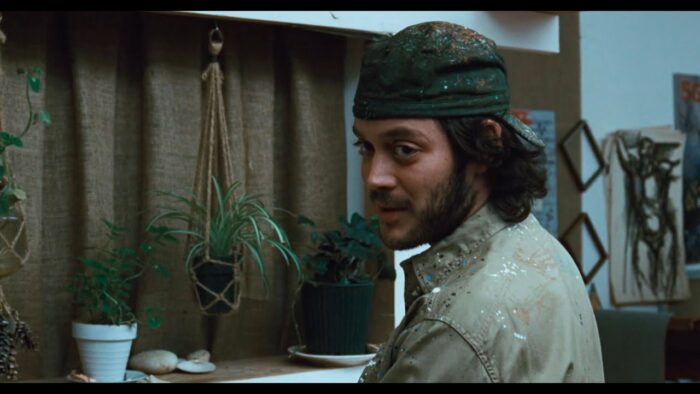
During his run of theater performances, Julia took on small roles in films like The Panic in Needle Park (1971). These included his feature debut as Marco, a small-time drug dealer, a small role that does little to showcase his acting chops. But it does highlight some of the humble beginnings for Julia. The overall story is about addiction and portraying the rampant heroin crisis in New York at the time.
Julia faced his fair share of discrimination during his early career. It was regularly seen in film that Hispanic/Latino characters would be portrayed with some stereotype in mind. Representation has come a long way since Julia’s early career, but there is still a ways to go. Still today, nearly a quarter of Hispanic/Latino leads are depicted in some way as a stereotype—despite Latinos accounting for around 19% of the U.S. population.
Ripe Strawberries (1980) is a short film starring Julia where you start to see the suave and debonair side of the actor. Julia plays a sensual and charismatic character who is celebrating his first year of love with an aging countess. It is not an over-the-top performance but it does give you a glimpse of his capabilities for his most infamous role to date. If you have about eight minutes to spare, it is great little watch.
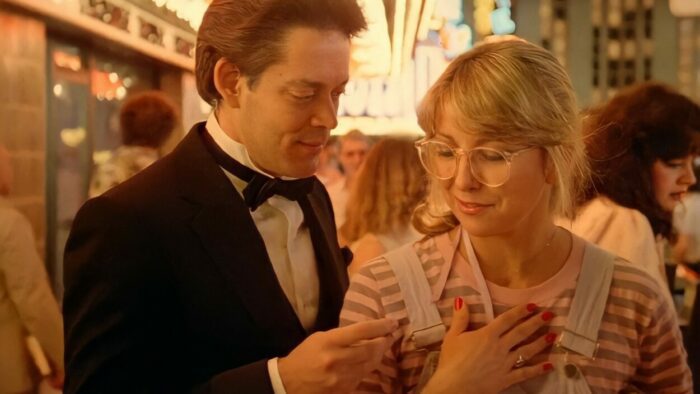
Soon to follow in 1981, Julia would go on to be a part of Francis Ford Coppola’s most ambitious project of the time, One from the Heart. After their fifth anniversary, Hank and Frannie (Frederic Forrest and Teri Garr) break up. Frannie runs off with Ray (played by Julia), singer/waiter in Las Vegas who dreams of Bora Bora. Although it was a financial failure, it is hard to take your eyes off the screen. If you take anything away from viewing One from the Heart, it would be how beautiful the set design is in this film. You can even spot some shots in the film that might have influenced other filmmakers. There is not much substance to Julia’s character and yet you cannot take your eyes off him and take in how charming he is. Given the overall story is convoluted, Julia is still a strong attraction to Terri Garr’s Frannie. It is another sultry performance as he shows off his dancing skills.
Kiss of the Spider Woman (1985) would end up being Julia’s breakout role. Julia plays Valentin Arregui, imprisoned due to his actions on behalf of a leftist revolutionary group. Valentin represents toxic machismo while also being homophobic. He shares a cell with Molina (William Hurt), a gay man who was imprisoned for “corrupting the youth.” The film earned four Academy Awards presentations and plenty of buzz, but Julia was left out while Hurt took home the Oscar for Best Actor.
Valentin despises Molina’s effeminacy and flamboyance, as well as his lack of interest in politics. Trapped in a cell together, they have no choice but to be civil. Molina begins to tell stories to Valentin to pass the time and comfort him. The two men are completely different and yet come together in their darkest moments. They are brought together by social injustice. The two men start to open up to each other and develop a deep care. It is a story that challenges ideas of masculinity. The majority of the film is filled with conversations between the two men.
Julia shines here giving a strong, emotionally supporting performance as Valentin. It is this film where he shows off the compelling stage and screen presence that he has. Their chemistry on screen is truly magnetic and it is hard to think these two had a hard time connecting. In an interview, Julia talks about how he and Hurt had trouble connecting and connecting with their respective characters. To solve this problem, they traded roles during rehearsals and were able to fully understand each other.
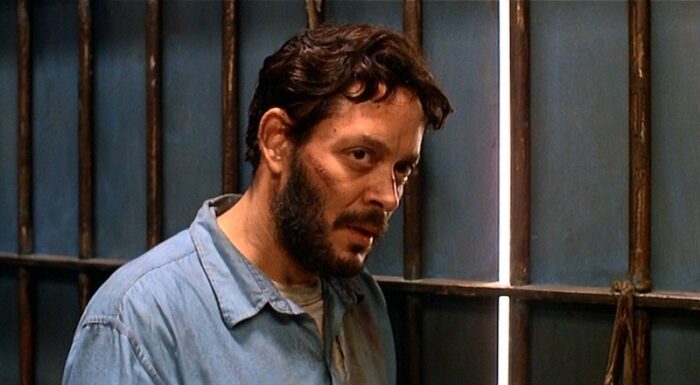
Julia spent his life seeking what was important to him and his legacy. His social consciousness bled into his later work. He was a passionate advocate for social justice and humanitarian causes. He used his platform to raise awareness of basic human rights. He was an advocate for ending world hunger. He understood that with technology we could not go on ignoring human suffering. The problems of the world were too big to ignore, we must come together to help one another. He said during one interview, “The world is getting smaller and smaller. It is no longer you or I. It is you AND I.” Having already played a political prisoner in Kiss of the Spider Woman, Julia would go on to play more politically charged roles. He would deliberately take on these roles to spread some awareness of what causes were close to him.
In 1989’s Romero he would portray Archbishop Oscar Romero and his life’s work. It depicts the uprising of the oppressive government of El Salvador. The Archbishop is slowly pushed to his limits and risks his life for the people. Oscar Romero was a man of the people. He fought for what was right and for basic human rights. With all his power, he would defend his people. It only feels right for Julia to take on this role. His portrayal of Oscar Romero with a soulful and impactful performance. It is a quieter performance from Julia but still has the fire and passion we know from him. It is another testament to the range that he possesses. It’s an Oscar-worthy performance.
Julia was a man who wanted to change the world. Any time he had a chance in an interview, he would make space to talk about humanitarian cases that were close to him. He would go as far as fasting for a week once a month. He was willing to do Romero and films like Romero for little to no pay because he knew the impact the story could make.
In 1990, Julia, his career well established by this point, would feature in Havana, starring Robert Redford (The Sting) and Lena Olin (Romeo Is Bleeding). At the time, the studio did not want to pay the fees it took to have Julia in the film and refused to include his name above the title with Redford and Olin’s. Regardless, he still wanted to be in the film because he saw the film as a retelling of the classic Casablanca. It might be one of the greatest uncredited acting performances, due to Julia’s essential performance.
Jack Weil (played by Redford) is a gambler who has made his way to Cuba. He finds himself smuggling revolutionary radio contraband on behalf of Bobby Duran (played by Olin), whom he is attracted to. However, Bobby is married to none other than Julia’s uncredited character. It may be a subpar film, not necessarily the greatest that has come from either Redford or Olin, but as far as Julia’s uncredited performance he proves once again that he is someone you cannot help to take your eyes off of when they appear on screen.
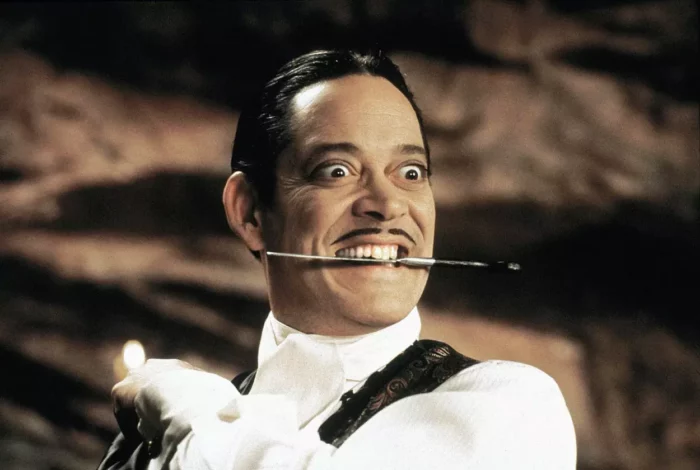
The Addams Family holds a very special place in my heart. Having been around since 1938, they have been a touchstone in every generation in some way. My introduction to the strange family was the two films from the ’90s. As a child watching him as Gomez Addams was spellbinding. It was electrifying. It was the closest I had come to a Shakespearean experience before I even knew who Shakespeare was. Back then I did not know much about anything but I knew this was the true craft of acting and this is an actor. In both The Addams Family and The Addams Family Values, he became this flamboyant and charismatic character. He not only revived Gomez Addams but became the blueprint for who Gomez should be.
It was the first time that Gomez was played by a Latino actor. The Addams Family was confirmed to be of Hispanic/Latino descent by artist/creator Charles Addams. Before Julia, it was John Astin who was Gomez. It was Astin who chose the name “Gomez” and affirmed his Spanish roots. In a world where we all suffer from nostalgia, it would have filled my heart with joy to see Julia revive the role of Gomez to some capacity in some way. The spooky family continues to rise from the dead and each time the new Gomez is compared to Raul Julia.
Julia later starred in the movie Street Fighter. He was convinced to take on the role of M. Bison by his two sons who were fans of the game. He wanted to make a film that both of them would enjoy, thus taking on the role of the dictating general. Julia is the highlight of the film, giving one of the greatest speeches in a video game adaptation. The delivery of the line, “For me, it was Tuesday” still gets me, it was pitch perfect. In no way is it a masterpiece. At times the story is hard to follow but it is a campy fun time. Over time, Street Fighter has become a cult classic.
In 1994, Julia played Chico Mendes, an Amazon rainforest activist in the made-for-television movie The Burning Season. His performance as an environmentalist elevates the film as a whole. In one of his final performances, The Burning Season showcases Julia’s incredible talents in a leading role. It follows his journey. He gives several passionate monologues throughout the film. He is a force, when he speaks you listen. With all of his projects, he gave commanding performances. The Burning Season was different: he gave up a piece of himself in this role.
In fact, Julia did give a piece of himself, for he was struggling with his health during the filming. Ultimately as he was shooting this film he was dying. Even as he struggled, you do not see an underweight, frail man, you see a man with will and dedication. He was dedicated to telling this story because it needed to be told, just like all of his roles. He would go on to earn a well-deserved Emmy for this performance.
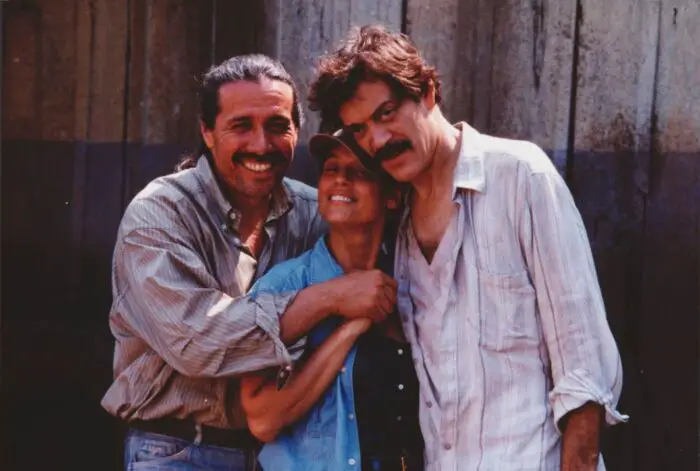
Not worried too much about his condition, Julia would go on to start reviewing the script for Robert Rodriguez’s Desperado. He would eventually drop out due to a stroke that put him on life support. He would die three days later from complications. He was only 54.
Raul Julia was a trailblazer for authentic representation. He did not waver in becoming someone else to please an audience. He was authentic to the very end regardless of whether this hindered any opportunities. Latino representation is still not where it should be in 2024, there is still a lack of such. Hispanic/Latino characters on-screen are still portrayed as stereotypes. However, more Hispanic/Latino storytellers and actors have been able to break ground. There are more freedoms to tell more authentic stories. While alive, He was a trailblazer for Latino representation in Hollywood. He left behind an incredible legacy filled with a love for the theater, for performance, for Puerto Rico, and humanity.




